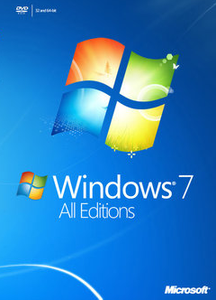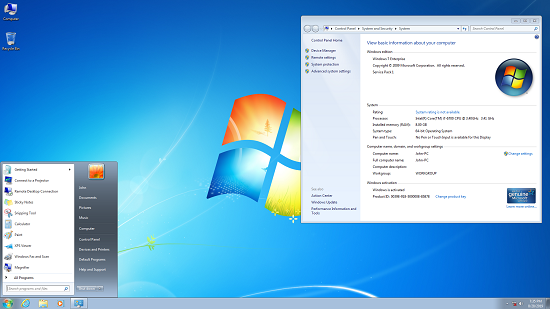EkThaTiger
Active Member

Windows 7 SP1 AIO Activated August 2019 x86 x64 ISO Multilingual
File Size: 6.15 GiB
Languages: English, Español, Português do Brasil, Svenska
Windows 7 is a personal computer operating system that was produced by Microsoft as part of the Windows NT family of operating systems. Windows 7 continued improvements on Windows Aero (the user interface introduced in Windows Vista) with the addition of a redesigned taskbar that allows applications to be "pinned" to it, and new window management features. Other new features were added to the operating system, including libraries, the new file sharing system HomeGroup, and support for multitouch input.
A new "Action Center" interface was also added to provide an overview of system security and maintenance information, and tweaks were made to the User Account Control system to make it less intrusive. Windows 7 also shipped with updated versions of several stock applications, including Internet Explorer 8, Windows Media Player, and Windows Media Center.
Among Windows 7's new features are advances in touch and handwriting recognition, support for virtual hard disks, improved performance on multi-core processors, improved boot performance, DirectAccess, and kernel improvements. Windows 7 adds support for systems using multiple heterogeneous graphics cards from different vendors (Heterogeneous Multi-adapter), a new version of Windows Media Center, a Gadget for Windows Media Center, improved media features, XPS Essentials Pack and Windows PowerShell being included, and a redesigned Calculator with multiline capabilities including Programmer and Statistics modes along with unit conversion for length, weight, temperature, and several others. Many new items have been added to the Control Panel, including ClearType Text Tuner Display Color Calibration Wizard, Gadgets, Recovery, Troubleshooting, Workspaces Center, Location and Other Sensors, Credential Manager, Biometric Devices, System Icons, and Display.
Windows Security Center has been renamed to Windows Action Center (Windows Health Center and Windows Solution Center in earlier builds), which encompasses both security and maintenance of the computer. ReadyBoost on 32-bit editions now supports up to 256 gigabytes of extra allocation. Windows 7 also supports images in RAW image format through the addition of Windows Imaging Component-enabled image decoders, which enables raw image thumbnails, previewing and metadata display in Windows Explorer, plus full-size viewing and slideshows in Windows Photo Viewer and Windows Media Center. Windows 7 also has a native TFTP client with the ability to transfer files to or from a TFTP server.
The taskbar has seen the biggest visual changes, where the old Quick Launch toolbar has been replaced with the ability to pin applications to taskbar. Buttons for pinned applications are integrated with the task buttons. These buttons also enable Jump Lists to allow easy access to common tasks. The revamped taskbar also allows the reordering of taskbar buttons. To the far right of the system clock is a small rectangular button that serves as the Show desktop icon. By default, hovering over this button makes all visible windows transparent for a quick look at the desktop. In touch-enabled displays such as touch screens, tablet PCs, etc., this button is slightly (8 pixels) wider in order to accommodate being pressed by a finger. Clicking this button minimizes all windows, and clicking it a second time restores them.
Window management in Windows 7 has several new features: Snap maximizes a window when it is dragged to the top of the screen. Dragging windows to the left or right edges of the screen allows users to snap software windows to either side of the screen, such that the windows take up half the screen. When a user moves windows that were snapped or maximized using Snap, the system restores their previous state. Snap functions can also be triggered with keyboard shortcuts. Shake hides all inactive windows when the active window's title bar is dragged back and forth rapidly (metaphorically shaken).
Windows 7 includes 13 additional sound schemes, titled Afternoon, Calligraphy, Characters, Cityscape, Delta, Festival, Garden, Heritage, Landscape, Quirky, Raga, Savanna, and Sonata. Internet Spades, Internet Backgammon and Internet Checkers, which were removed from Windows Vista, were restored in Windows 7. Users are able to disable or customize many more Windows components than was possible in Windows Vista. New additions to this list of components include Internet Explorer 8, Windows Media Player 12, Windows Media Center, Windows Search, and Windows Gadget Platform. A new version of Microsoft Virtual PC, newly renamed as Windows Virtual PC was made available for Windows 7 Professional, Enterprise, and Ultimate editions. It allows multiple Windows environments, including Windows XP Mode, to run on the same machine. Windows XP Mode runs Windows XP in a virtual machine, and displays applications within separate windows on the Windows 7 desktop. Furthermore, Windows 7 supports the mounting of a virtual hard disk (VHD) as a normal data storage, and the bootloader delivered with Windows 7 can boot the Windows system from a VHD; however, this ability is only available in the Enterprise and Ultimate editions. The Remote Desktop Protocol (RDP) of Windows 7 is also enhanced to support real-time multimedia application including video playback and 3D games, thus allowing use of DirectX 10 in remote desktop environments. The three application limit, previously present in the Windows Vista and Windows XP Starter Editions, has been removed from Windows 7. All editions include some new and improved features, such as Windows Search, Security features, and some features new to Windows 7, that originated within Vista. Optional BitLocker Drive Encryption is included with Windows 7 Ultimate and Enterprise. Windows Defender is included; Microsoft Security Essentials antivirus software is a free download. All editions include Shadow Copy, which-every day or so-System Restore uses to take an automatic "previous version" snapshot of user files that have changed. Backup and restore have also been improved, and the Windows Recovery Environment-installed by default-replaces the optional Recovery Console of Windows XP.
A new system known as "Libraries" was added for file management; users can aggregate files from multiple folders into a "Library". By default, libraries for categories such as Documents, Pictures, Music, and Video are created, consisting of the user's personal folder and the Public folder for each. The system is also used as part of a new home networking system known as HomeGroup; devices are added to the network with a password, and files and folders can be shared with all other devices in the HomeGroup, or with specific users. The default libraries, along with printers, are shared by default, but the personal folder is set to read-only access by other users, and the Public folder can be accessed by anyone.
Windows 7 includes improved globalization support through a new Extended Linguistic Services API to provide multilingual support (particularly in Ultimate and Enterprise editions). Microsoft has also implemented better support for solid-state drives, including the new TRIM command, and Windows 7 is able to identify a solid-state drive uniquely. Native support for USB 3.0 is not included due to delays in the finalization of the standard. The video modes supported in Windows 7 are 16-bit sRGB, 24-bit sRGB, 30-bit sRGB, 30-bit with extended color gamut sRGB, and 48-bit scRGB.
For developers, Windows 7 includes a new networking API with support for building SOAP-based web services in native code (as opposed to .NET-based WCF web services), new features to simplify development of installation packages and shorten application install times. Windows 7, by default, generates fewer User Account Control (UAC) prompts because it allows digitally signed Windows components to gain elevated privileges without a prompt. Additionally, users can now adjust the level at which UAC operates using a sliding scale.
SP1, which is short for Service Pack 1, is an important update to Windows 7 which brings a number of stability, performance, and most importantly, security improvements to the operating system. It is a crucial update if you are still running Windows 7, as the operating system is old and vulnerable to attack.
Editions Included
Windows 7 Starter x86
Windows 7 Home Basic x86, x64
Windows 7 Home Premium x86, x64
Windows 7 Professional x86, x64
Windows 7 Ultimate x86, x64
Windows 7 Enterprise x86, x64

DownLoad
Single Link
NitroFlare
RapidGator
UploadGiG
Single Link
NitroFlare
RapidGator
UploadGiG
